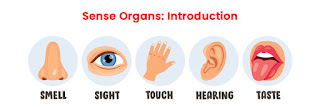Five Sense Organs
Senses recognise the things around us and send signals to our brains. The human brains and various other organs receive those signals to interpret those signals and understand the things around us. Our sense organs respond to the external stimuli in our environment to unravel the things around us.
Functions of Human Sense Organs
Five sense organs name
1. Eyes(Sight)
The eyes, in the human body, are the receptors of light.
2. Nose (Smell)
The nose is responsible for the sense of smell in the human body.
3. Ears (Hearing)
Ears are the organs that are responsible for auditory perception which help in hearing.
4. Skin (Touch)
The skin is the largest part of our body and allows us to feel touch, temperature, pressure, vibration, pain, heat and chills, and all other sensations.
5. Tongue (Tasting)
The tongue gives living organisms their sensation of taste.
Read more in detail Human Sense Organs and their importance on human life.
Join Live class for school courses Nursery to 12th class
Tag - Sense Organs; Name of Sense Organs; Functions of Sense Organs; school online class; online class 3

Comments
Post a Comment
Thank you we will contact ASAP.